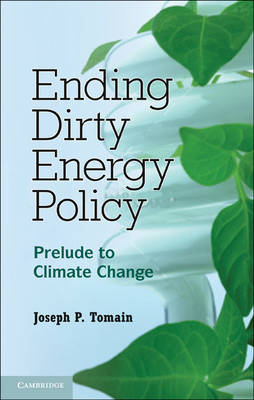
Ending Dirty Energy Policy
Cambridge University Press (Verlag)
978-0-521-12785-1 (ISBN)
Climate change presents the United States, and the world, with regulatory problems of a magnitude, complexity and scope unseen before. The United States, however, particularly after the mid-term elections of 2010, lacks the political will necessary to aggressively address climate change. Most current books focus on climate change. Ending Dirty Energy Policy argues that the US will not adequately address climate change until it transforms its fossil fuel energy policy. Yet there are signs that the country will support the transformation of its century-old energy policy from one that is dependent on fossil fuels to a low-carbon energy portfolio. A transformative energy policy that favors energy efficiency and renewable resources can occur only after the US has abandoned the traditional fossil fuel energy policy, has redesigned regulatory systems to open new markets and promoted competition among new energy providers, and has stimulated private-sector commercial and venture capital investment in energy innovations that can be brought to commercial scale and marketability.
Joseph P. Tomain is Dean Emeritus and the Wilbert and Helen Ziegler Professor of Law at the University of Cincinnati Law School, which he joined in 1987 and where he held the deanship for 15 years. He practised general litigation in New Jersey before beginning his teaching career at Drake University School of Law. Dean Tomain has also held positions as Visiting Professor at the University of Texas Law School; Distinguished Visiting Energy Professor at Vermont Law School; visiting scholar in the program of Liberal Studies at the University of Notre Dame; Visiting Fellow at Harris Manchester College, Oxford University; Fulbright senior specialist in law in Cambodia; and visiting environmental scholar at Lewis and Clark Law School. His most recent book is Creon's Ghost: Law, Justice, and the Humanities (2009). Dean Tomain is chair of the board of KnowledgeWorks Education Foundation, founder and principal of the Justice Institute for the Legal Profession and a board member of the Greater Cincinnati Foundation. He is also a Fellow of the American Bar Association, is actively involved with the ABA Section on Legal Education and Admissions to the Bar and is a member of the American Law Institute. He has published widely in the field of energy law and policy.
Preface; Introduction; 1. A regulatory history of dirty energy law and policy; 2. Protectionist assumptions; 3. The next generation is now; 4. Consensus energy policy; 5. Fossil fuel future; 6. Electricity future; 7. Venture regulation; 8. Smart energy politics; 9. Conclusion – strategies for the energy future.
| Zusatzinfo | Worked examples or Exercises |
|---|---|
| Verlagsort | Cambridge |
| Sprache | englisch |
| Maße | 155 x 230 mm |
| Gewicht | 440 g |
| Themenwelt | Naturwissenschaften ► Biologie ► Ökologie / Naturschutz |
| Recht / Steuern ► EU / Internationales Recht | |
| Recht / Steuern ► Öffentliches Recht ► Umweltrecht | |
| Technik ► Umwelttechnik / Biotechnologie | |
| Wirtschaft ► Volkswirtschaftslehre ► Wirtschaftspolitik | |
| ISBN-10 | 0-521-12785-8 / 0521127858 |
| ISBN-13 | 978-0-521-12785-1 / 9780521127851 |
| Zustand | Neuware |
| Haben Sie eine Frage zum Produkt? |
aus dem Bereich


